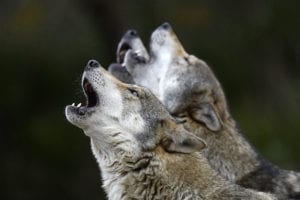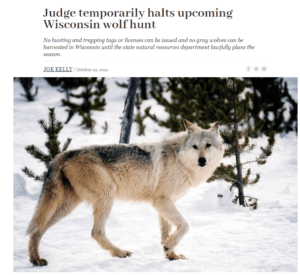
Due to the plight of gray wolves in a number of states across the country, there are efforts to regain protections for both wolves in the Northern Rockies and what is called the national population,
which was removed from the endangered species list by the US. Fish and Wildlife Service (FWS) in 2020 and includes 44 states inhabited and not inhabited by wolves.
Gray wolves in the Northern Rockies, including Idaho, Montana and Wyoming are under siege. Both Idaho and Montana have passed legislation that allows for the eradication of 90% and 85% of wolves, respectively. State paid bounties, trapping, and snaring are allowed; Idaho even allows for the killing of newborn pups and nursing mothers in their dens. Montana allows hunters to bait wolves from Yellowstone National Park and kill them after the wolves step across the park border onto state lands. In Wyoming, anything goes in 88% of the state, with killing by almost any method, at any time, in any number and without a license.
This was the same behavior that wiped wolves off the landscape in the United States a century ago. And here we are, witnessing this needless massacre of wolves once again.
That’s why the International Wildlife Coexistence Network joined the Western Watershed Project and 70 conservation groups in petitioning the U.S. Fish and Wildlife Service to provide protections, once again, to wolves in the Northern Rockies. FWS determined that our petition contained sufficient scientific information that listing may be warranted and has started a one-year status review. If that review is positive, then it will take another year to provide Endangered Species Act protections. While this is progress on the road to relisting, that means these wolves will have to endure this brutal and deadly war for two more years.
But the FWS does have the option to provide emergency protections for gray wolves in the Northern Rockies. They even said so in the original 2009 final rule.
Should relisting be required, we may make use of the emergency listing authorities under section 4(b)(7) of the Act to prevent a significant risk to the well-being of any recovered species. This measure will preclude inadequate regulatory mechanisms from threatening the wolf population in any State or recovery area. While our post-delisting monitoring window is 5 years, meaningful changes in State law or management objectives that would significantly increase the threat to the wolf population could lead to reconsideration of listing, including the potential for emergency listing, at any point. For example, if a State changed their regulatory framework to authorize the unlimited and unregulated taking of wolves, a condition we have previously determined threatened a wolf population, emergency listing would be immediately pursued. Finally, as an additional layer of protection, the Act allows for citizen petitions to consider relisting should the population’s status change.
IWCN and other conservation organizations are advocating that FWS act on this promise, to emergency list the gray wolves in the Northern Rockies due to “the inadequacy of existing regulatory mechanisms,” which is clearly the case with the current laws on the books in Idaho (SB1211) and Montana (SB314 and 267) and Wyoming’s current wolf management plan.
In November of 2020, the U.S. Fish and Wildlife Service removed federal protections for the gray wolf in the lower 48 states. That decision affected gray wolves in 44 states, including wolf populations in the Great Lakes and the Pacific Coast states. (see map).

That triggered a shocking wolf hunt in Wisconsin that lasted only three days, killing 216 wolves, more than 80 percent over the allowed quota of 119 and nearly 20 percent of the state’s estimated 1000 wolves. Even so, Wisconsin was set to launch a second wolf hunt in November with a target of 300 wolves. But a judge issued a temporary injunction, halting the season until the Department of Natural Resources updates its regulations related to wolf management.
Conservation groups, represented by EarthJustice, were in court in November 2020 to argue for reinstating Endangered Species Act protections for gray wolves in 44 states (this is the national case). Should conservation groups win this lawsuit, it will protect wolves that inhabit Wisconsin and other Great Lakes states, western states, including California (which has state protections for the species) western parts of Oregon and Washington, and Colorado (which is launching their own, voter supported, recovery effort). Unfortunately, a victory in the national relisting lawsuit that restores federal protection will not simultaneously protect wolves in the Northern Rockies, including Idaho, Montana, and Wyoming (this population also includes wolves in eastern Oregon, Washington and part of Utah). These wolves were removed from the list of endangered and threatened species more than 10 years earlier and are not covered by this lawsuit. (Update: February 2022, a federal judge restored protections for wolves in these 44 states, but not in the Northern Rockies)
Both efforts are important for the future of wolves in the United States. We must all work together and raise our voices to let the FWS and the states know that wolves are a valuable and valued part of our national heritage and deserve a safe place on the landscape where they can survive and thrive.
What can you do? The Fish and Wildlife Service is still accepting comments on the Northern Rocky Mountain wolf relisting through the end of January. You can help by submitting your comments. It’s important to provide information in your comments that FWS will have to address, so we encourage you to include the talking points we provide here as well as the language we have provided above regarding the ability and promise the FWS made to emergency list wolves should state laws or regulations threaten the wolf population. There is currently no opportunity to comment on the efforts to relist the national wolf population.

